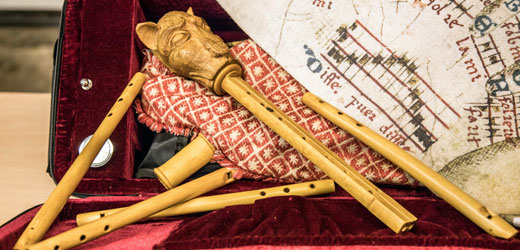WIND INSTRUMENTS | Level 2 – intermediate
Bagpipe/Pipe & Tabor: A grant piperie – Dance Music for Wind Instruments
6 sessions - Self-paced
Online
Course Description
The pastoral world was particularly interesting to Old French writers. As a sign of their fascination, these writers often place themselves in fictional tales interacting with shepherds and shepherdesses. The Old-French pastourelle, particularly popular during the 13th century, made use of certain features of what has been called the style popularisant: use of refrains, characters being called by their common names (Robin and Marot among others), use of senseless words (civalala, duri), etc. Besides all these features, the Old-French pastourelle was a canvas in which wind instruments were often portayed. Their inclusion helped defining the genre as much as the aforesaid features. This fact indicates to us the strong connection, if only symbolic, between the idyllic pastoral world of medieval writers, performers, and audiences on the one hand, and bagpipes, pipe & tabor and Panpipes on the other.
In this course students will:
Explore the different types of repertoire that can be associated with wind instruments
Study the connection of particular pieces with the instrument
Study the broader context of these compositions
Prepare the pieces for performance
Expand his/her repertoire and technique
 Instructor:
Instructor:
Raúl Lacilla
COURSE INFO
DATES & DURATION
February 19 to June 10, 2024
6 sessions – Self-paced
Location
Online
Price
1 credit ECTS: 360€
Languages
English - Spanish
Level
Level 2 / Intermediate
Prerequisites
Musicians with intermediate or advanced technique on the selected instrument (or has taken the beginner course) and basic knowledge of Medieval music notation.
Access to a medieval bagpipe or pipe & tabor or related wind instruments is necessary. Please check with us.
Syllabus
Teaching Methodology
This course will be comprised of:
-
- 6 virtual one-on-one lessons (1 hour each)
- Recorded introductory lecture or one group live Q&A session (30 min)
- 6 tutorial videos (10-15 minutes each)
- Downloadable materials and links to additional resources
Schedules and assignments:
-
- The class dates and times will be scheduled with the instructor.
- There will be some suggested deadlines to submit assignments.
- The student workload to take the lessons, review the materials and practice is approximately 4.25 hours per session.
- Students taking the course for credit must complete all assignments and class requirements.
Technical Requirements
-
- Broadband Internet connection / WIFI
- External or internal webcam
- External or internal microphone
- Speakers or headphones
- Possibility of printing downloaded materials
- Possibility of scanning your assignments
- Possibility of auto-recording (audio and video)
Enroll Now
Places are limited for each section, so sign up early.





